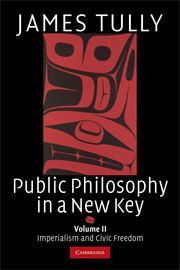Book contents
- Frontmatter
- Contents
- Acknowledgments
- Credits
- INTRODUCTION
- PART 1 GLOBAL GOVERNANCE AND PRACTICES OF FREEDOM
- PART 2 ON IMPERIALISM
- 5 On law, democracy and imperialism
- 6 Communication and imperialism
- 7 The imperial roles of modern constitutional democracy
- CONCLUSION: CIVIC FREEDOM CONTRA IMPERIALISM
- Bibliography
- Index to Volume II
6 - Communication and imperialism
Published online by Cambridge University Press: 05 September 2012
- Frontmatter
- Contents
- Acknowledgments
- Credits
- INTRODUCTION
- PART 1 GLOBAL GOVERNANCE AND PRACTICES OF FREEDOM
- PART 2 ON IMPERIALISM
- 5 On law, democracy and imperialism
- 6 Communication and imperialism
- 7 The imperial roles of modern constitutional democracy
- CONCLUSION: CIVIC FREEDOM CONTRA IMPERIALISM
- Bibliography
- Index to Volume II
Summary
PREAMBLE: PIERRE TRUDEAU'S ETHOS OF CIVIC PARTICIPATION
The question I address in this chapter is the following: Is it possible to establish communicative networks of reciprocal elucidation between public philosophy and civic freedom in our present age that not only are imperial but also have undergone a recent communications revolution? I open with a form of civic ethics that was articulated prior to the communications revolution.
At the heart of former Canadian Prime Minister Pierre Trudeau's ethics is the activity of paddling against the current. As early as 1944, in ‘The Ascetic in a Canoe’, he said the ideal of paddling against the current is ‘the resolve to reach the saturation point. Ideally, the trip should end only when the paddlers are making no further progress within themselves.’ What does this ethic mean in practice today?
In the 1980s Trudeau campaigned for nuclear disarmament, downsizing military–industrial complexes, resisting the media's glorification of violence as the means to resolve disputes, and for the turn to peaceful and dialogical means of coping with disagreement. He saw this campaign for human security through peace and dialogue as a part of the civic ethics he had always practised. He said that he opposed big concentrations of power: superpowers, military–industrial complexes, media conglomerates, big corporations and the enormous global inequalities these power networks enforce. His means of opposing big concentrations of power was to empower all citizens to participate in the democratic struggles for freedom and equality.
- Type
- Chapter
- Information
- Public Philosophy in a New Key , pp. 166 - 194Publisher: Cambridge University PressPrint publication year: 2008

